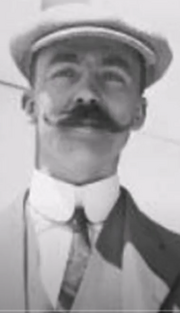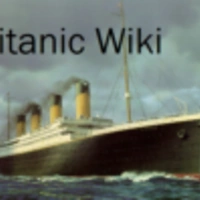
Frederick Ray
Frederick Dent Ray (June 20, 1879 - January 15, 1977) was one of the last remaining male survivors of the RMS Titanic and was one of the longest living among the surviving crew.
Early life[]
Frederick Dent Ray was born in Southwark, London, England on June 20, 1879. He was the son of Charles Adolphus Hopson Ray (1847-1913) and Sarah Newport (1848-1919). In 1908, he was married in Berkshire to Annie Beatrice Burt in 1855. They remained childless. First Class Saloon Steward Frederick Dent Ray had worked on other White Star liners, like the Majestic and Olympic. He was on Olympic in Belfast early in 1912 during minor repairs. In a letter to founder and president of the Titanic Historical Society, Edward Kamuda, Ray wrote that at that time he had been transferred to the nearly completed Titanic. Thomas Andrews was keenly interested in overseeing her construction and was on site often to talk to yard workers and personally inspect her progress. According to Ray’s testimony at the American Inquiry, he served Andrews meals onboard during the final weeks of fitting out before her maiden voyage.
Aboard Titanic[]
Aged 32, Ray boarded the RMS Titanic on April 10, 1912 as a First Class Saloon Steward for a monthly wage of £3,15p after being redirected from the ship RMS Olympic.
On Sunday 14th of April, his shift ended at 9 P.M. and he went to one of the Glory Holes on E-deck where he and 27 other stewards slept. Awoken by the collision, he first thought it was a problem in the engine room, and he began to drift back to sleep when two stewards arrived to tell people to prepare and go to the lifeboats.
After assisting recalcitrant passengers into lifeboats 9 and 11, Mr. Ray boarded the fully loaded lifeboat 13. As the boat was lowered into the water, a wrapped infant was tossed down to Ray, who caught the child and brought it to safety. He had to endure some scary moments because lifeboat 15 nearly came on top of them when they were were pushed beneath the lowering lifeboat by pumpwater coming out of the side of the ship.
Ray survived the sinking and made it to the ship RMS Carpathia. He returned home to his wife, who was in North Wales for recuperation from ill health.
Remarkable[]
An interesting fact about Frederick Dent Ray is that he made a lot of use of a First Class Accomodations Plan during his work. He actually had it on him when boarding lifeboat 13 and because of that, it survived the disaster. These plans became a later source of fascination for many Titanic enthousiasts and hobbyists.
Later life[]
Frederick's wife Annie died in 1952. He was remarried a few months later to Rose Mary Ray, née Lawrence (b. 4 December 1890). They spent some time in Maidstone, Kent, before settling in Billericay, Essex, where he spent the rest of his life.
He gave an interview in 1958 about his experience on the night of the sinking:[]
I: "Mister Ray, could you tell me what you were doing on the night of the 14th of April 1912."
"I went to bed about 10:30.Just dozing off and i felt a shock similiar to a train being pulled up in the station. I laid awake some time probably about ten mintues and was then called by a superior steward who told me to get up right away becaus the ship hd struck an iceberg.He was very serious, we got to get up to the boats. I laid awake some time after that, I thought he was pulling my leg and I dozed off again."
I: "And then what happened?"
"Somebody else came shout out in the doorway: 'All hands to the boats!' Then I thought it was time to get up."
I: "So you got up and what did you do then?"
"I went up on deck, from E-Deck.......to A-Deck. Stood about there, on deck, which is the Boat Deck. And errr... seemed to.... things seemed to be dragging rather and it was very cold, so I decided I'd like to get an overcoat to put on. I went down from A-Deck to E-Deck."
I: "Back to your cabin?"
"Back to my cabin, and ehm, got my overcoat. Opened my suitcase, took some hangsters out, which my wife always supplied me, so that I had a good supply of... and errrr... , one or two other things; my toothbrush and shaving gear.... I thought: were ever I was next I should require them, and came out, nobody about, deck was deserted. The alleyway was deserted. I got through the doorway onto the main staircase. There I met Mr. Rothschild, walking up the main staircase and we joined company and I walked up with him and.... . he started talking about the accident. He didn't think it was serious enough to trouble, and oh I said oh well I said: "I've got to get along I said i'm one of the members of the crew, and ehm... they want me, rowing." So I went up. On the way up I saw the errr... pursor with five of the staff of the Pursor's Office, with the uhm.... safes open. And they had mail bags there, they were putting the jewels and jewelboxes into the mail bags, laughing and talking, chatting, one to the other. I continued my... on my way to the boat deck, and on the way up, I heard an uh.... fiddle. I wonder who ever was playing a fiddle at that time.... and there.... transpired afterwards. It was the band! I thought it might be a passenger playing a fiddle."
I: "Did you recognize what tune they were playing?"
"No, they weren't playing any tune, they were tuning on the fiddle, and I went along to the boat. Number thirtheen boat. I saw it was nearly full up, and we were.... I started putting other passengers and people in, helping them over the boa... over the rail and into the boat. There was one very fat lady there, and she was crying out she didn't want to go into a boat, she says: 'I've never been into a boat in my life.' and she is: 'I don't want to go'. and I said, well I said: 'You've got to go, so you better be...better keep quiet.' And it took about four men and two men in the boat and about two men on the deck to hoist her over the rail to get her into the boat. Eventually we got her in and err.... then ehm I saw another somebody else helping the people in, I recognized the man named Washington Dodge, he was a recorder in San Fransisco and I met him on the Olympic in a pre.... on a previous occasion a I persuaded him to come on the errr... come back on the Titanic. And of course, when we sail from Southampton I recognized him and we had a chin wag and we talked to one another, and he had a wife, and a little boy about four years old, about five or that, and err..."
I: "They all got in the same boat?"
"No they didn't. I said: 'Where's your little.... where's your wife and your little boy?' He said, well he said: 'They've gone in another boat' and errrr.... I said, well I said: 'Come on lad, you get in this boat, we should want somebody to row' and later on, on the Carpathia, when his wife said: 'how did you come to get in the boat, he said, well he said: 'I was all ordered in by an officer'. I had my peaked cap on which you've never seen me in before. They recognized me as an officer and to my order and got into the boat."
I: "There were, there were at this time I presume no woman and children left on the deck."
"No, there were no children or anybody as a matter of fact, only...."
I: "Where would the other people have been at this time then?"
"Well they were inside, must have been inside the ship. I could see the whole length of the ship, because it was light, the lights of the ship were on on the ship at that time and there was nobody inside."
I: "So in fact they thought they were safer in their own cabin? They didn't realise...."
"That's it! They, the people that didn't get into the boats, didn't want to get into the boats untill it was too late."
I: "I see. Well then your boat was lowered."
"Boat was lowered. Very jumpy business. First we were tipping up this way, and they were tipping up that way and I thought if we get into the water, alright, we should be very lucky. And eventually we did get in the water, and the next problem was to get the boat loose from the ship so we didn't go down with the ship."
I: "So you succeeded in that and you were pulling away and then you watched the ship go down."
"I watched the lights. Portholes disappearing one after the other, you know and err... everybody in the boat was anxious to get away before the ship went down because they thought that they would be... they said that they .... 'we're alongside the ship, when she goes down we should be sucked down with her and the boat will be upset."
I: "How many people would you had in your boat?"
"62."
I: "62? That was all...."
"They counted them on the Carpathia, you see. When each boat came up, they got the number of the boat, and they counted them as we went up".
Frederick died in Basildon Hospital on 15 January 1977 following complications from fracturing his hip and was later cremated. Aged 97 years, 6 months and 26 days, he became the longest living among the surviving crew and his death left only two remaining crewmen, Frank Prentice and Sidney Daniels.
